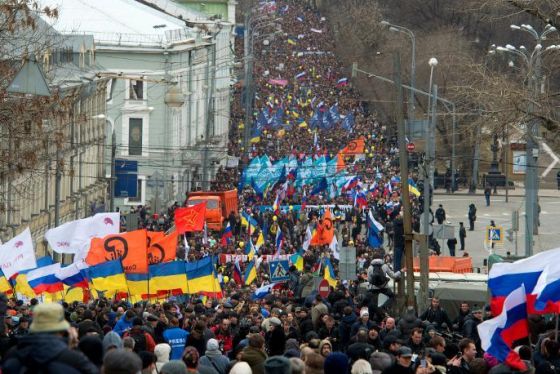
AFP reports: Around 50,000 people rallied in central Moscow Saturday in protest at Russia’s intervention in Ukraine, a day before the Crimean peninsula votes on switching to Kremlin rule.
Waving both Ukrainian and Russian flags and shouting slogans heard during the anti-government protests in Kiev, the demonstrators urged Russian President Vladimir Putin to pull troops back from a Cold War-style confrontation.
Marchers carried placards reading “Putin, get out of Ukraine” and others comparing Russia’s move on Crimea with the Nazi annexation of the Sudetenland as Europe rushed headlong into World War II.
Many of the protesters adopted the chants and slogans of Ukraine’s popular uprising that ousted President Viktor Yanukovych last month.
University professor Yelena Orlova, 47, whose sign read “Ukraine is a sovereign state”, said she did not expect the rally would change her government’s position, but believed it was her duty to speak out.
“I don’t agree with the policy of Putin,” she told AFP. “I am against the annexation of Crimea. I think Russia should respect the borders of Ukraine.” [Continue reading…]


Remarkable. The Russians appear to be exercising the same rights which Americans and Europeans cherish – to march against military adventurism and be ignored by the government.
But here’s the difference — and it’s not trivial: the Americans and Europeans marching in dissent know that being ignored is the biggest risk they face. The Russians, on the other hand, are not so much exercising a right as testing the limits of what the state will tolerate.
50,000 people is too many to arrest, but when protests have been smaller there have been mass arrests.
As multiple news outlets were shut down this week, Rachel Denber at Human Rights Watch wrote: “I do not recall a more dramatic silencing of the media in post-Soviet Russia.”
Remember all the publications in the US that got shut down when the war in Iraq started? Me neither — because there weren’t any.
Americans enjoy greater political freedom and freedom of expression than anyone else on the planet. If this freedom often looks worthless, maybe it’s because it isn’t being exercised very well by very many.
In Russia, the specter of Soviet-era oppression is on the rise. When political protesters witness that the threat of forced psychiatric treatment is being applied against those who challenge Putin, I think it’s for Russians to measure the width between their freedoms and those possessed by Americans. I think that Americans who imagine we are all in the same boat, are doing nothing more than rationalizing their own inertia.
Like all Americans, I was raised to believe that political participation in the affairs of the nation was one’s civic duty. I no longer believe that it is a moral failure not to do so. The unique conditions of extravagant abundance under which American liberal democracy was formed and thrived and upon which it depends are rapidly passing away in plain sight for anyone willing to see. Industrial civilization itself is now the issue, and we are all in that boat. The marching Russian masses don’t have any more of a clue than the pampered and entitled American masses… “the dance of the dream-led masses down the dark mountain”.
I’ll have to admit, I am amused by American faith in our “free” press. Lapdog press is more appropriate.
Eugene — You’re responding to a comment made by a blogger (me) who is not affiliated with the lapdog press and during 12 years of blogging has never had any reason to imagine that his publication was going to get shut down by the government. I have periodically poured scorn on reporters for the New York Times and expressed my contempt for two American presidents, knowing that I am neither at risk of getting arrested or sued for libel.
If anyone coming here recognizes the value in my editing skills, it’s hopefully because they can see that I use a huge amount of discrimination in choosing the material that I put on this site. I don’t apply cookie-cutter ideological litmus tests deeming some sources inherently reliable or others inherently unreliable but in each instance attempt to assess the reliability of each particular piece of reporting or analysis and the strength and insightfulness of each piece of commentary.
The irony about expressions like “lapdog press” is that even though they start out as useful and accurate labels, they end up becoming substitutes for critical analysis. There is an abundance of information that finds its way from the mainstream media to the so-called alternative media, and readers who typically do not pay close attention to sources will read news agency reports (from Reuters, AFP, or AP) or commentary and see these items as products of Raw Story, Information Clearing House, etc.. They think they are savvy news consumers because they rely on the alternative press, yet are sadly lacking in media literacy.
What kind of dolt would view the New York Times — the epitome of the lapdog press — as an invaluable resource? Oh, that happens to be the assessment of Noam Chomsky.